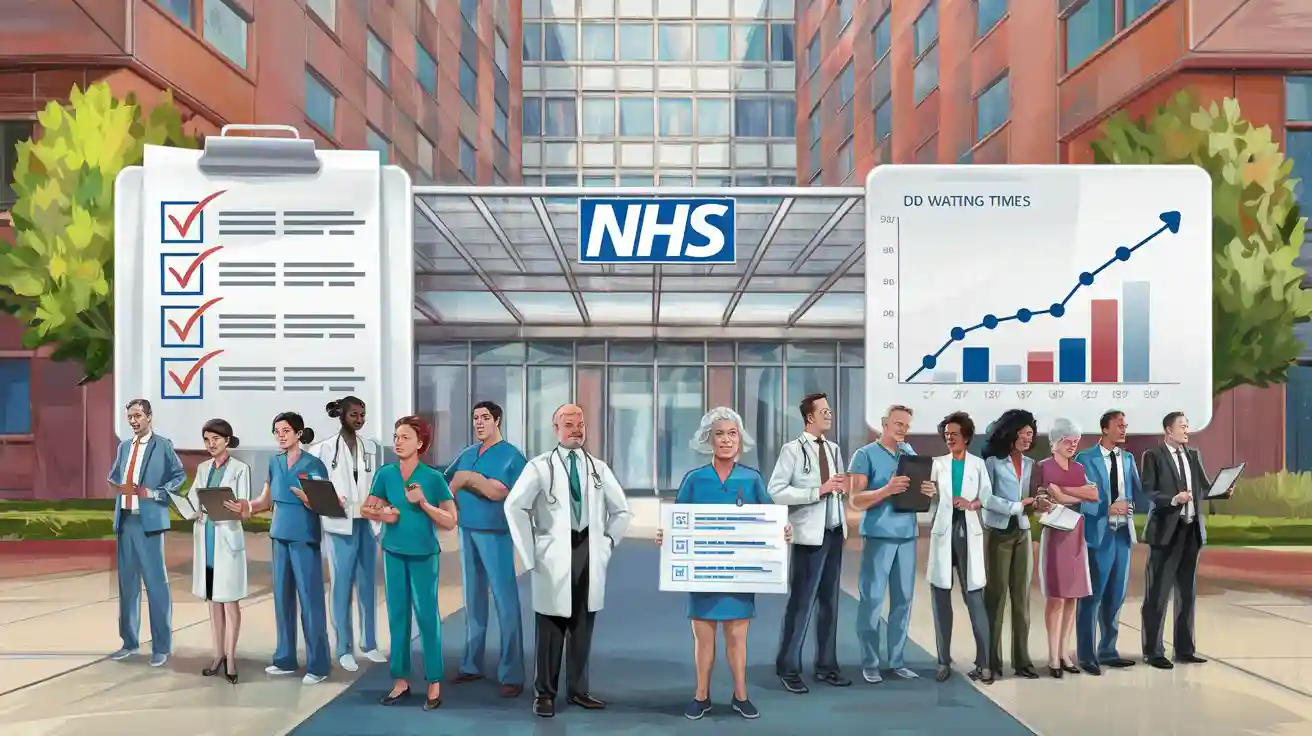Government to tie NHS hospital funding and staff pay to patient satisfaction and waiting list improvements

The government has unveiled new NHS plans in which hospital funding and staff pay will be linked to patient satisfaction and reduced waiting times. This strategy will rely on patient feedback surveys and performance-based remuneration. A recent review indicated that NHS funding linked to patient satisfaction does not always lead to improved care. While staff often find the surveys useful, they frequently struggle to implement changes without additional support.
Key Takeaways
The NHS will connect hospital money and staff pay to how happy patients are and how short waiting times are. This is to make care better and more efficient. - Patient feedback from surveys will help decide funding. This will push hospitals to listen to patients and make real changes. - Rewards can help staff work harder, but the NHS will also give support and training. This will help staff meet targets and still give safe, patient-centred care.
NHS Funding Linked to Patient Satisfaction
Patient Satisfaction Ratings
The government wants to use patient satisfaction ratings for NHS funding. Hospitals will ask patients to fill out surveys like the Friends and Family Test. These surveys ask about care, how easy it was to get help, and if staff explained things well. Patients share their thoughts after each visit or stay.
Patient ratings are very important in this plan. The NHS uses numbers from big surveys and stories from interviews. Staff look at these results to find out what is good and what needs to change. The NHS also uses this feedback to compare hospitals across the country.
Research shows that staff experience affects patient experience. Dawson (2009) found that better staff conditions mean happier patients. In 2005, the Healthcare Commission said hospitals with skilled staff got better ratings. These studies show that linking NHS funding to patient satisfaction can help care improve.
NHS Hospital Funding Mechanisms
NHS hospital funding will now depend on patient satisfaction ratings. The government will use patient feedback and other data to decide funding. Hospitals with high scores may get more money. Hospitals with low scores may need to spend money on improvements.
Hospitals collect patient feedback with surveys after care. They use tools like the GP Patient Survey and the Friends and Family Test. These surveys ask about access to care, trust in staff, and overall experience. Hospitals also look at staff numbers and local community data to help explain results.
Note: NHS hospital funding will change based on patient numbers, staff levels, and local deprivation. This helps make things fair for all hospitals.
The NHS uses maths to link feedback to funding. Mediation analysis shows that about 30% of the effect comes from staff numbers. Hospitals with more staff often get better ratings. The NHS also changes funding based on hospital size and local needs.
Hospitals that do not meet targets may need to spend more on training or services. The government hopes this plan will make hospitals listen to patients and improve care. Studies show that hospitals doing research and quality work often have better results and happier patients.
Staff Pay and Waiting Lists
Reducing Waiting Times
The NHS has long waiting lists for many treatments. These delays can make patients feel worried. Sometimes, waiting too long can make health problems worse. The government wants to link staff pay to shorter waiting times. Staff who help reduce waiting lists could get bonuses or higher pay. This plan rewards teams that treat more patients quickly and safely.
Many things affect how long patients wait. Not enough staff makes it hard to see everyone on time. When the NHS hires more staff or uses new technology, waiting times usually go down. Surgical hubs help by keeping planned operations separate from emergencies. This means more patients get treatment without last-minute changes. Staff in these hubs say they feel happier and their workdays are smoother.
Note: Long waits can hurt patients’ health and well-being. Shorter waiting times help patients feel better about the NHS.
The NHS also uses better scheduling to cut delays. Hospitals that improve these systems often have fewer patients waiting over four hours in emergency departments. These changes help, but there is no clear proof that linking pay to waiting list cuts always improves care. The NHS keeps testing new ideas to find the best ways to shorten waits and help patients.
Staff Incentives and Satisfaction
The new policy links NHS staff pay to shorter waiting lists and patient satisfaction. The goal is to encourage staff to give high-quality care and work more efficiently. Staff may get bonuses if their teams meet targets for shorter waits and better satisfaction scores.
Research on pay-for-performance in the NHS shows mixed results. Some studies found that money rewards can change how staff work, like improving processes or saving money. But these rewards do not always make patients happier or care better. Sometimes, staff feel more pressure and less able to focus on each patient. For example, the Quality and Outcomes Framework did not clearly improve satisfaction or communication.
Staff incentives can help with motivation, but they also cause problems. Some staff like the extra pay and recognition. Others worry about more work or losing focus on patient-centred care. The NHS workforce plan now includes training and support to help staff reach new goals. The plan also tries to keep staff happy and stop them from leaving.
Tip: Staff who feel supported and valued are more likely to stay and give better care.
The NHS will keep checking how these changes affect staff and patients. Leaders hope linking pay to waiting list cuts and satisfaction will help. But they know it is important to keep a balance. The NHS must make sure staff stay motivated and always focus on safe, good care for all patients.
Goals, Concerns, and Implementation
Reform Objectives
The ten-year plan wants to change healthcare in England. The government hopes to make care better and more efficient. They also want people to trust the NHS more. The plan gives clear targets for NHS staff and training. The table below lists some main goals for the next ten years:
Target Area | Specific Long-term Statistical Target | Timeline |
|---|---|---|
Medical School Places | By 2031/32 | |
Medical Degree Apprenticeships | Train 2000 students via medical degree apprenticeships | By 2031/32 |
Undergraduate Medical Degrees | Shorten duration from 5-6 years to 4 years | By 2031/32 |
Workforce Expansion | Increase numbers and scope of Physician Associates and Anaesthesia Associates | By 2031/32 |
Research shows that money rewards can help care and efficiency. But these rewards might not work for a long time. The Model Hospital programme has helped trusts save money and use resources better. This supports the big changes planned for the NHS.
Criticisms and Risks
Many NHS leaders, staff, and unions worry about the new plan. Some main risks are:
Small tests make it hard to use lessons everywhere.
Bad reporting can make people trust the plan less.
It is hard to meet local needs and national goals at the same time.
Note: Many checks are not deep enough because there is not much time or money.
Implementation and Evaluation
The plan will start in a few pilot areas. It will use lessons from old programmes like Vanguard and Pacesetters. These pilots last two or three years and look at cost, patient experience, and if changes last. The NHS will use numbers and feedback to see how things are going. They will check things like falls, emergency waits, satisfaction, and money. The plan will be checked often to make sure it meets its goals and gives better care for everyone.
The NHS wants to make care better by connecting money and staff pay to how happy patients are and how long they wait.
Only 24% of people say they are happy with NHS services, and many still wait a long time for care.
Some people worry that these new targets could make staff feel stressed and might hurt the quality of care.
The NHS will keep checking how things are going and listen to what people say to make sure the changes are fair and work well.
Do you think these changes will change your own NHS visits?
FAQ
What is patient satisfaction in the NHS?
Patient satisfaction is about how happy people are with NHS care. The NHS asks patients to fill out surveys after their care. These surveys help the NHS see what is good and what needs to get better.
How will NHS staff pay change?
Staff could get extra money for making waiting lists shorter. They might also get bonuses if patients are happier with their care. The NHS hopes this will help teams work better and give good care.
Will all hospitals get the same funding?
No, not every hospital will get the same amount of money. The NHS will look at patient satisfaction scores, hospital size, and what each area needs. This is to make sure every hospital gets a fair share.
See Also
Is There Progress In Reducing NHS Waiting Times?
How Patients Can Help Shorten NHS Waiting Periods
Exploring The Impact Of NHS Waiting Times On Patients
Reasons NHS Waiting Lists Persist Despite Government Changes

